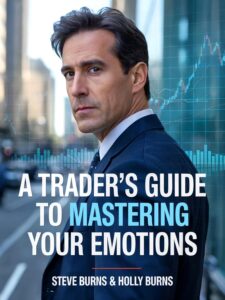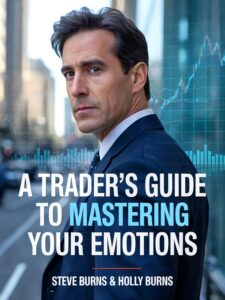Buying and selling is usually described as a battle between logic and emotion. Whereas technical evaluation, elementary analysis, and threat administration type the inspiration of profitable buying and selling, feelings can shortly undermine even probably the most subtle methods. The distinction between worthwhile merchants and those that blow up their accounts typically comes right down to emotional management. Understanding which feelings pose the best risk is step one towards successfully managing them.
Each dealer, from novice to skilled, faces the identical psychological challenges. Markets are designed to take advantage of human feelings, triggering worry on the backside and greed on the prime. The dealer who masters their emotional responses positive aspects a big edge over those that function on impulse and feeling. This text ranks the 5 most harmful feelings that sabotage buying and selling success, from probably the most harmful to the least threatening inside the prime 5.
1. Greed: The Account Destroyer
Greed stands alone as the one most harmful emotion in buying and selling, because it instantly causes probably the most vital and catastrophic losses. When greed takes management, rational decision-making turns into absent. Merchants below the affect of greed start to see each alternative because the “large one” that may change their monetary lives perpetually.
This emotion manifests in a number of harmful behaviors. Overleveraging turns into commonplace as merchants persuade themselves that greater positions imply greater income. Cease losses get ignored or moved additional away to “give the commerce extra room.” Day trades remodel into swing trades, and swing trades develop into long-term holds, all as a result of the dealer can’t settle for a slight loss or reasonable acquire after they’ve imagined large income.
Greed additionally causes merchants to remain in successful positions far too lengthy, driving them previous optimum exit factors and watching income evaporate. The dealer thinks, “If I made this a lot already, think about how rather more I might make.” This pondering typically ends in giving again substantial positive aspects and even turning successful trades into losers.
Probably the most devastating side of greed is the way it compounds. After making a substantial revenue by way of luck or extreme risk-taking, merchants typically imagine they’ve found a method for fulfillment. They improve place sizes dramatically, tackle extra threat, and ultimately face a commerce that strikes towards them with catastrophic power.
2. Concern: The Paralysis Creator
Concern ranks second as a result of whereas it could not blow up accounts as spectacularly as greed, it slowly drains profitability and creates psychological injury that’s tough to beat. Concern operates in two main modes: paralysis and panic.
Concern of paralysis retains merchants from executing their methods. They see excellent setups that meet all their standards, however can’t pull the set off. The inner dialogue turns into dominated by worst-case eventualities and what-if questions. Such a worry causes merchants to overlook the very alternatives they frolicked figuring out, resulting in frustration and additional emotional injury.
Panic worry triggers throughout lively trades, particularly when positions transfer towards the dealer. This emotion may cause untimely exits from successful trades on the first signal of a pullback. Merchants experiencing panic worry will shut positions for tiny income that ought to have been held for bigger positive aspects, or exit trades proper earlier than they reverse of their favor.
The insidious nature of worry is that it turns into self-reinforcing. Lacking alternatives as a consequence of worry creates remorse, which will increase anxiousness about future trades. Taking small income out of worry means the dealer wants the next win charge to beat commissions and unfold prices, making profitability more durable to attain.
3. Hope: The Silent Killer
Hope deserves its place because the third most harmful emotion as a result of it operates quietly, virtually seeming like a optimistic high quality till the injury turns into obvious. Whereas hope may seem to be optimism, in buying and selling, it transforms into denial and delusion.
When a commerce strikes into loss territory, hope whispers that the place will come again. The dealer begins to rationalize why they need to maintain on regardless of the unique evaluation proving incorrect. Cease losses get moved or eliminated fully. The phrase “It’s only a short-term pullback” turns into a mantra whereas losses deepen.
Hope encourages averaging down, the place merchants add to shedding positions at decrease costs, believing they’re “shopping for the dip.” This conduct dramatically will increase threat publicity on trades which have already demonstrated they’re transferring towards the dealer’s thesis. What began as a manageable loss balloons into an account-threatening place.
The hazard of hope is that sometimes it really works. A inventory does reverse, a forex pair comes again, and the dealer escapes with a small revenue or a break-even outcome. This intermittent reinforcement makes hope much more harmful as a result of it validates the harmful conduct, encouraging repetition till a commerce doesn’t come again, and the account suffers extreme injury.
4. Revenge: The Impulsive Gambler
Revenge buying and selling, pushed by anger and frustration, ranks fourth as a consequence of its means to compound losses shortly. After experiencing a loss, particularly one which feels unjust or sudden, merchants typically really feel a burning must “get even” with the market instantly.
This emotion utterly abandons a buying and selling technique and threat administration. The dealer enters positions impulsively, typically with a bigger measurement than typical, looking for to get well losses in a single commerce. The evaluation turns into superficial or nonexistent because the emotional must win overrides rational pondering.
Revenge buying and selling usually follows a sample. A dealer takes a loss, feels indignant or embarrassed, and instantly enters one other commerce with out correct evaluation, leading to one other loss and additional escalating the conduct. This cycle can flip a single shedding day right into a devastating week or month, damaging each the account and the dealer’s psychological confidence.
The mixture of impulsivity, extreme place sizing, and lack of research makes revenge buying and selling significantly harmful. Merchants experiencing this emotion typically acknowledge what they’re doing however really feel unable to cease till they’ve both recovered or utterly blown up their account.
5. Overconfidence: The Complacency Creator
Overconfidence rounds out the highest 5 as a result of, whereas it develops extra slowly than different feelings, it units the stage for vital losses. This emotion usually emerges after a successful streak or interval of success when merchants start to imagine they’ve mastered the markets.
Overconfident merchants typically take shortcuts of their evaluation and threat administration, which might result in vital losses. Place sizes improve as a result of “I do know what I’m doing.” Cease losses develop into ideas relatively than guidelines. The wholesome respect for market uncertainty that protects capital begins to fade, changed by a perception in a single’s means to persistently predict market actions.
This emotion is especially harmful as a result of it feels good. The dealer experiences a way of management and experience that’s each rewarding and addictive. Warning indicators are sometimes dismissed because the dealer attributes all success to talent, relatively than acknowledging the function of favorable market situations or luck.
Overconfidence typically leads on to one of many different harmful feelings. The overconfident dealer turns into grasping, taking bigger dangers. When markets inevitably humble them, worry or revenge buying and selling can observe. The cycle continues till the dealer both develops real self-discipline or exits buying and selling fully.
Conclusion
The emotional challenges of buying and selling aren’t weaknesses to be ashamed of however relatively common human responses to uncertainty and threat. Each profitable dealer has battled these 5 feelings and developed techniques to mitigate their affect. The trail ahead isn’t about eliminating feelings, however relatively about creating buying and selling frameworks that perform independently of emotional states.
A complete buying and selling plan with mechanical entry and exit guidelines removes many emotional choice factors. Correct place sizing ensures no single commerce can set off panic or revenge. Cease losses shield towards the harmful whisper of hope to carry on. Common breaks stop overconfidence from constructing after successful streaks.
The dealer who acknowledges these emotional threats and builds defenses towards them positive aspects an unlimited benefit. Markets will at all times create conditions designed to set off feelings similar to greed, worry, hope, revenge, and overconfidence. Success belongs to those that acknowledge these feelings after they come up and refuse to allow them to dictate buying and selling selections.
For an examination of all 17 main buying and selling feelings, try my e book: A Dealer’s Information to Mastering Your Feelings: Tips on how to Use Buying and selling Psychology to Be Extra Worthwhile within the Inventory Market


